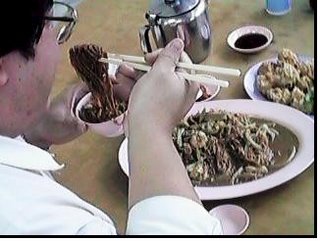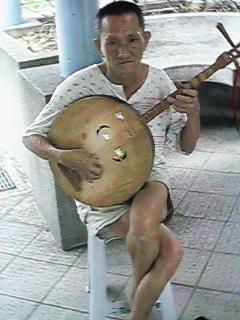An Old Hokkien Ditty and Hokkien food
There's an old Hokkien* ditty that I remember from childhood days. It's surrealistic, if this term can be applied not only to visual art, but to songs and poetry as well. Like Salvador Dali's art, it conjures up images that can only possibly appear in dreams. Like "Alice in Wonderland" , it is nonsensical, and yet profound. When I hear it, it seems to be saying something important to me that lies beyond the words, though I know not exactly what. This photograph of a busker at the Mass Rapid Transit Station in Tampines, Singapore playing the traditional Chinese guitar the Pi-Pa was taken many years ago. He was singing this ditty:
The Sky is black, its going to Rain,
Grandpa went to dig a Drain,
Tortoise carried the Lantern, Snake beat the Drum; they said
The Beggar broke wind, and the Tiger was dead
* Hokkien, or in Mandarin Fujian are the people of Fujian province, on the South-Eastern coast of China bordering Taiwan. Living in an area with not much arable land, the poverty-stricken Hokkien were also one of the main groups of emigrants in the Chinese Diaspora. Westerners often associate Chinese with the Cantonese speaking people of Guangdong province, partly because of the prevalence and sophistication of Cantonese cuisine. Little is known of Hokkien cuisine, though it is a distinct cuisine. Perhaps because it is rough-and-ready, peasant food, it is not so attractive to most people. Hokkien food is stolid and solid and reminds me of German food, with plenty of carbohydrates to fill the stomach. But being a coastal province, Hokkien cuisine also uses seafood, especially oysters and other shellfish. Hokkien festival dishes are hefty, heavy dishes such as pig trotters braised in soya sauce, sea cucumber with duck, and fish maw [stomach] soup with vinegar. Oyster omelette, prawn rolls and liver rolls are also featured. My favorite dishes are : [1]Pig's stomach with white pepper and ginko nuts in a clear soup. [2] Braised pork belly in black soya sauce wrapped in soft buns and eaten like a sandwich.
If you were born a Hokkien, you would probably miss Hokkien food very much. For Hokkien cuisine is rarely found overseas and to find it would send you into a state of ecstasy. I have searched for true Hokkien food in the Chinatowns of Manhattan, Flushing, Queens NYC, Philadephia, Edison, NJ and Princeton, NJ to no avail.
Living here in the United States, I miss going with friends to the old restaurants in Singapore that serve good Hokkien food [though with modernization, these restaurants may be gone by the time I return to Singapore]. Washed down with copious quantities of Chinese tea, we would sit late into the night, swapping tales amid the chatter of taxi drivers, women of the night with their clients, tattooed triad members and other denizens of the late night Singapore scene.
"A good bowl of Mee*,
a steamimg cup of Tea,
my chopsticks I merrily twirl,
And all is well with the World"
* hokkien rice noodles.





Comments
Post a Comment